| Srl | Item |
| 1 |
ID:
020902
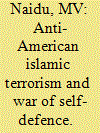

|
|
|
|
|
| Publication |
Nov 2001.
|
| Description |
1-33
|
|
|
|
|
|
|
|
|
|
|
|
|
|
|
|
| 2 |
ID:
066180
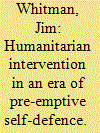

|
|
|
| 3 |
ID:
132300
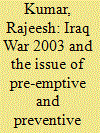

|
|
|
|
|
| Publication |
2014.
|
| Summary/Abstract |
The adoption of pre-emptive self-defence as a policy by the United States of America in its war against terrorism has revived the controversy over the concept of pre-emptive use of force in international politics. Some scholars argue that states are stretching the right of self-defence as pre-emptive, preventive and anticipatory in accordance with their needs and interests and to justify their actions. For others, in the context of changing security threats such as terrorism and Weapons of Mass Destruction pre-emptive strikes are permissible. These efforts to redefine and re-interpret the right of self-defence and use of force for justifying state's actions have challenged the role of international organisations that were principally designed to regulate the unilateral use of force, and to maintain international peace and security. Against this backdrop, this article will examine how the pre-emptive and preventive use of force undermines the role of the United Nations in international politics through probing the case of Iraq War 2003. This would be a much needed reflection on the implications of Iraq War on multilateralism in the context of 10 years after the war.
|
|
|
|
|
|
|
|
|
|
|
|
|
|
|
|
| 4 |
ID:
020886
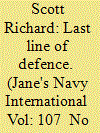

|
|
|
|
|
| Publication |
March 2002.
|
| Description |
10-18
|
|
|
|
|
|
|
|
|
|
|
|
|
|
|
|
| 5 |
ID:
133313
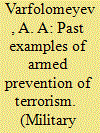

|
|
|
|
|
| Publication |
2014.
|
| Summary/Abstract |
The paper examines the admissibility of preventive antiterror operations in other states, citing historical examples of specific armed conflicts. It draws parallels between the international situation in the 1970s and in the 2000s, noting the changes in the UN Security Council's stand on the matter.
|
|
|
|
|
|
|
|
|
|
|
|
|
|
|
|
| 6 |
ID:
106961
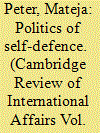

|
|
|
|
|
| Publication |
2011.
|
| Summary/Abstract |
This contribution considers an alternative approach to the research on the use of force, a field that has been largely dominated by international legal scholars. I argue for application of an evolutionary approach to international (legal) norms, one that complements current legal approaches and moves the discussion of norms beyond their dichotomous legal/illegal understanding. This kind of research highlights the role of politics in international law and allows us to determine factors influencing dissemination of international norms. Through a study of seven post-Second World War cases, I trace the development of both narrow and expanded notion of preemptive self-defence and conclude that while ascertaining legality of specific actions is vital for understanding established international law, one cannot talk about radical breaks in development of the law on the use of force. The expanded concept is in fact a product of the evolution of (societal) norms on self-defence and an accumulation of previous successful challenges in metanorms on the use of force.
|
|
|
|
|
|
|
|
|
|
|
|
|
|
|
|
| 7 |
ID:
079192
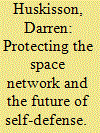

|
|
|
|
|
| Publication |
2007.
|
| Summary/Abstract |
The inherent right of self-defense is critical in protecting the United States (U.S.) space network from growing threats. The scope of this right is frequently questioned, and as applied to the space network, raises several questions. To what extent does the right of self-defense extend outside U.S. territory? Is it permissible under this right to defend non-U.S. registered space assets? What is the standard for establishing an "armed attack" in space? Is the intent of the attackers or the scope of the attack relevant in exercising this right in space? In a 2003 case from the International Court of Justice, the Case Concerning Oil Platforms, many of these questions were addressed, not in the context of a space war, but in the context of a factually analogous conflict, the Tanker War of the 1980s. The Oil Platforms case may be a harbinger for an international shift in the interpretation of the inherent right of self-defense in such a manner as to severely limit U.S. military options in response to an attack on it space systems. This is a shift the U.S. must be prepared to counter
|
|
|
|
|
|
|
|
|
|
|
|
|
|
|
|
| 8 |
ID:
140641
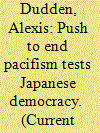

|
|
|
|
|
| Summary/Abstract |
Japan’s ruling coalition, headed by Prime Minister Shinzo Abe, forced a set of 11 controversial new security bills through the lower house of the National Diet (parliament) in July 2015. Upper house deliberation had just begun as of this writing and was following a similar playbook. Abe and his supporters want the bills enacted by the close of the parliamentary session at the end of September. The voting procedure makes passage likely even if all the opposition parties band together. Public opinion, however, is overwhelmingly opposed to the substance of the bills, which would effectively end the postwar constitution’s ban on Japanese military forces engaging in war abroad. What unfolds in the coming months will clarify the strength and nature of democratic society in Japan today
|
|
|
|
|
|
|
|
|
|
|
|
|
|
|
|
| 9 |
ID:
171255
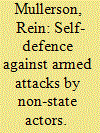

|
|
|
|
|
| Summary/Abstract |
Armed attacks in the sense of Article 51 and customary international law can be carried out not only by States, but also by non-State actors (NSA). Self-defensive responses to attacks by NSAs, due to their specific characteristics, may contain a combination of elements of anticipatory self-defence and defensive reprisals. If a State, from the territory of which an attack originates, is unable to prevent an NSA attacking a third State, it has to ask for and to accept the assistance of the victim State, other States, or relevant international organisations. The latter cannot use military force in self-defence in such circumstances without having first sought the consent of the territorial State. However, if a State is unwilling to prevent an NSA, operating from its territory, from attacking third States, it becomes an accessory-after-the-fact to armed attacks of the NSA. Self-defensive, either individual or collective, measures can be carried out on the territory of such a State even without its consent.
|
|
|
|
|
|
|
|
|
|
|
|
|
|
|
|
| 10 |
ID:
058825


|
|
|
| 11 |
ID:
146576
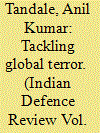

|
|
|
|
|
| Contents |
The states which are nurturing and nursing terrorists must be held responsible for the conduct of non-state actors because they operate from within the territorial boundaries of the host country. Every state is bound to respect the sovereignty of other countries, and hence these states cannot avoid its liability by any excuses. India’s vital interests can be better served by invoking the expanded doctrine of offensive self-defence, which has witnessed a normative evolution, particularly in relation to non-state actor, following the events of September 11, 2001. This expanded doctrine, has also gained acceptance of the Western power and scholars which permit the victim states to use force against non-state actors and breach the territorial sovereignty of foreign states in response to an accumulation of terrorist attacks.
|
|
|
|
|
|
|
|
|
|
|
|
|
|
|
|